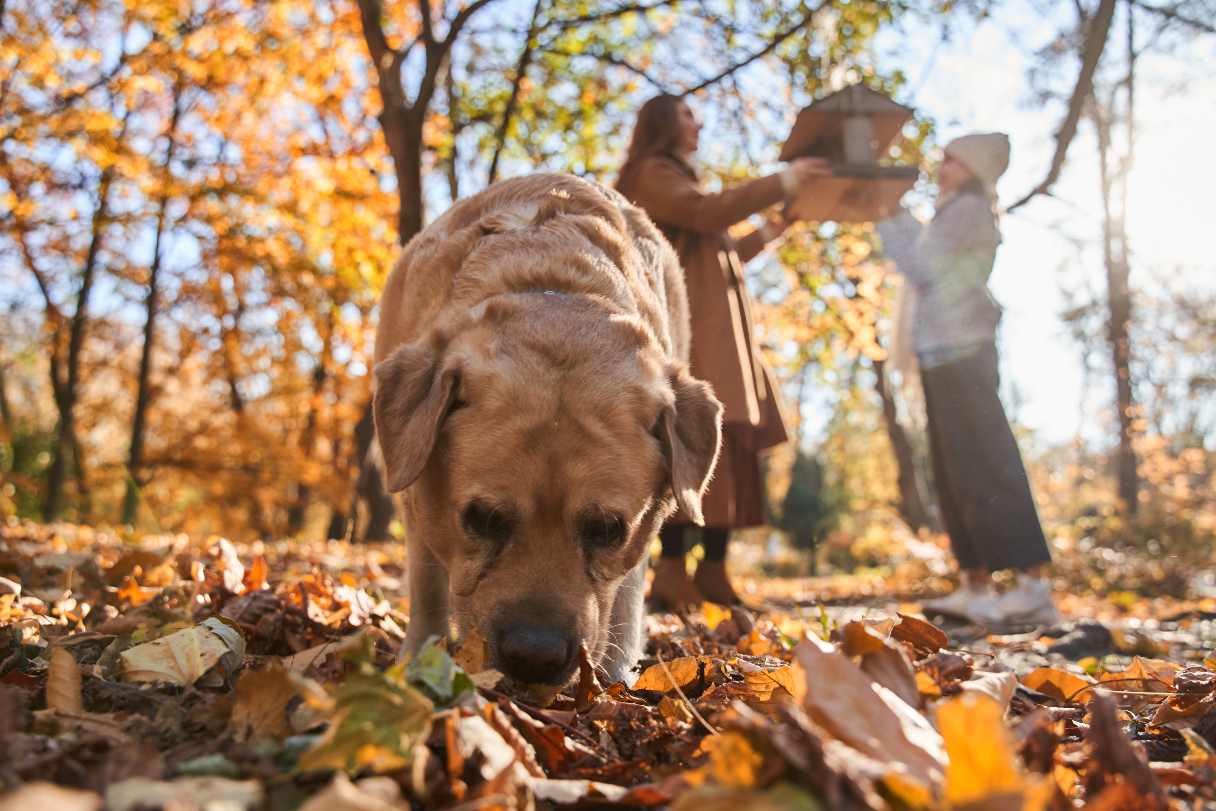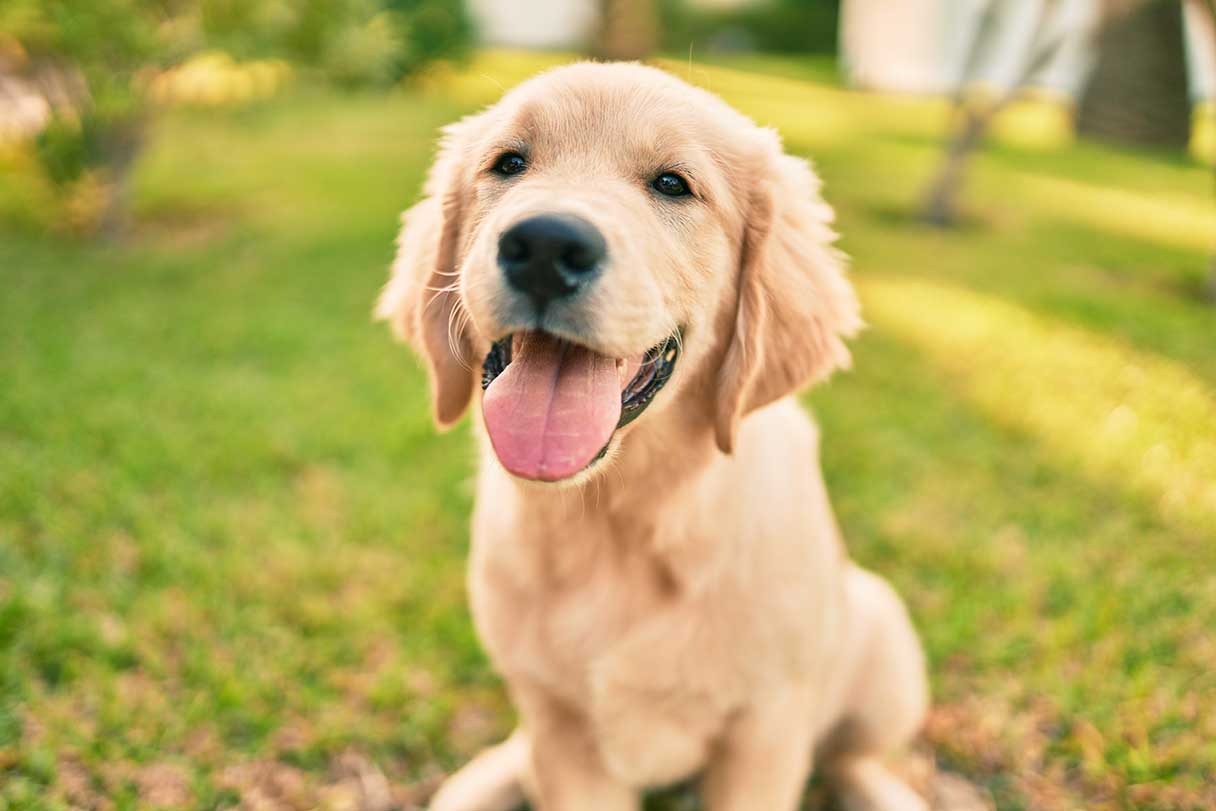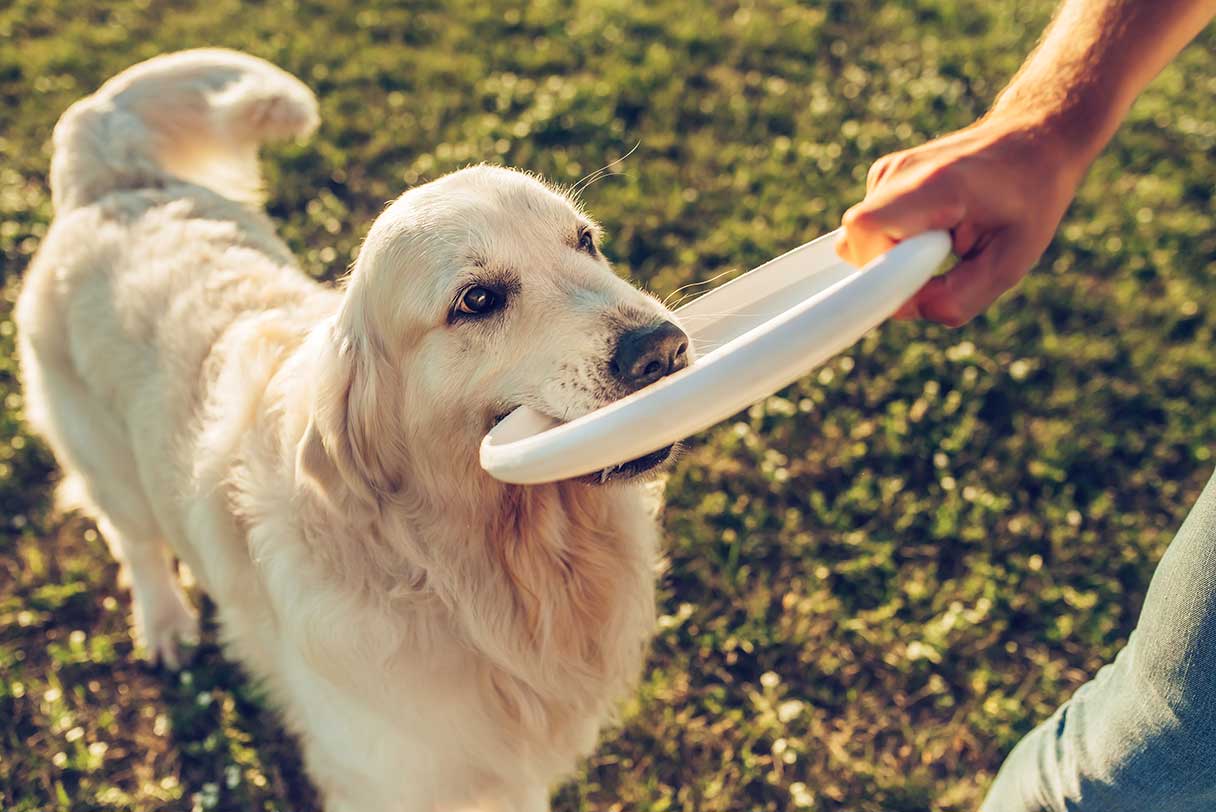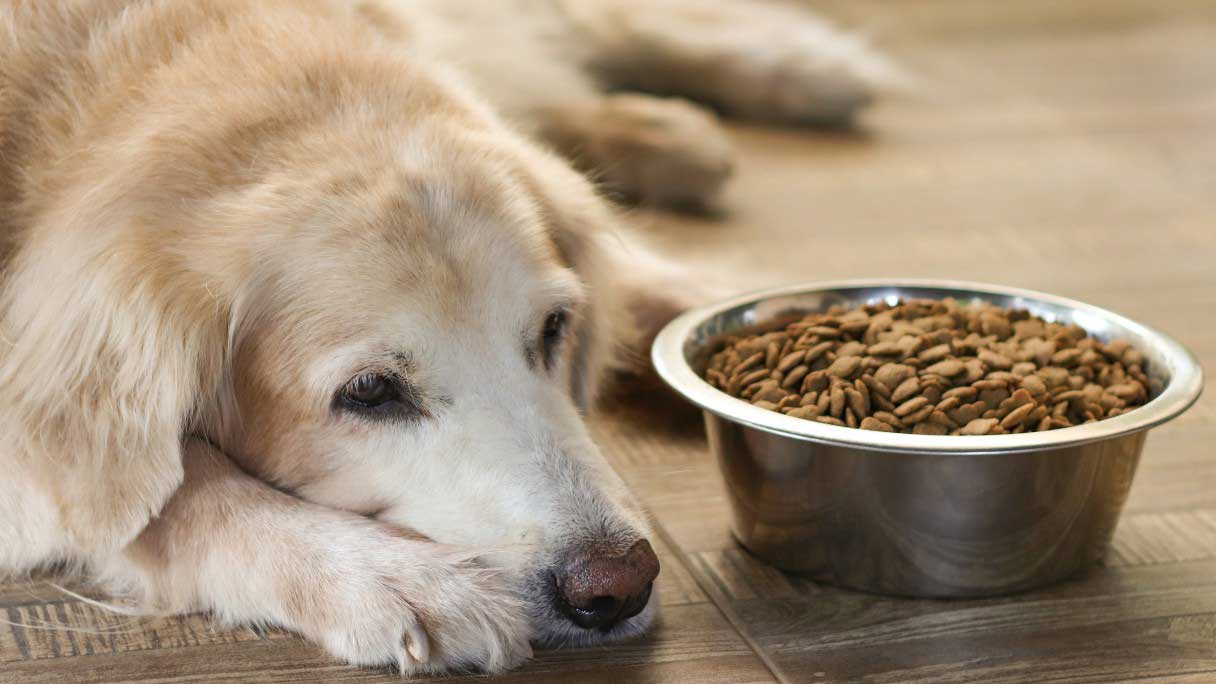If your dog raids the cat's litter box like you raid the fridge or happily chows down on piles left by the neighbor's dog, you might wonder: Is it normal for dogs to eat poop? Rest assured, this quirky dog behavior is not uncommon. One in four dogs has been caught in the act at least once, while one in six dogs makes a regular habit of snacking on the brown stuff.1
The scientific name for this behavior is coprophagia, and a wide range of reasons can help explain why dogs engage in it. But just because your dog thinks eating poop is neither gross nor abnormal doesn't mean you should encourage it. While sampling their own poop is generally harmless, snarfing up what's left behind by animals could expose your dog to contagious diseases, like parvo, as well as to bacteria and internal parasites that can cause illness. And those sloppy wet kisses could pass those things on to you, too.
Here are 13 common reasons that might explain why your dog eats poop, along with helpful tips for getting them to stop.
1. Vitamin or Nutrient Dietary Deficiencies
Some dogs may eat poop as a means of trying to get nutrients that are lacking in their regular diet. Some studies suggest that a vitamin B deficiency might lead some dogs to eat poop. So this could be a dog's way of getting the enzymes and nutrients they're missing.
Tips to help get them to stop: Try adding a digestive supplement with enzymes to their diet, along with a multivitamin that contains essential B vitamins. Probiotic supplements might also improve digestive issues that can cause poop-eating.
Also, talk to your vet about what you’re feeding your dog. They can help you choose dog food that meets all of your fur bud’s nutritional needs.
2. Hunger
Dogs who are hungry a lot tend to eat poop, possibly because to them it still looks and tastes like food.4 While some dogs are simply obsessed with eating, there may be more serious reasons why they’re hungry, including not being fed enough at meal times, an underlying health condition or medication that increases appetite.
Tips to help get them to stop: Check with your vet to make sure there's no underlying illness causing your dog's incessant hunger and to ensure you're feeding your dog the proper amount for their breed and size. Talk to them about any medications your dog is taking and possible side effects.
If your dog just loves to eat, a slow feeder bowl or puzzle bowl can help slow down their eating pace, making them feel more satisfied with their meal. Feeding your dog at least twice a day and sticking to a regular feeding schedule will help reassure them that more food is coming. Between meals, healthy treats like fiber-rich pumpkin, fruits and veggies (like green beans) can help them feel fuller and keep them from tiding themselves over with poo. Make sure to limit the total amount of treats to no more than 10% of their total daily calories.
3. Instinct
Wolves and other wild canines sometimes eat poop that’s been left in areas where the pack hangs out. Researchers believe this behavior protects other pack members from illness caused by parasites. This could be an instinct that has been passed down to dogs from their wild ancestors.
Tips to help get them to stop: Good training can override instinctive behavior. Teach your dog the “Leave it" command so you can stop them when they're about to take a bite of another animal's poop.
4. Attentive Mothering
Dogs with newborn puppies lick the feces from their behinds to help them stay clean. As the puppies start soiling in the nursing area, their mothers will continue to clean up after them by eating their poop.
Tips to help get them to stop: There's no need. This is natural behavior for nursing dogs, and they typically stop on their own once the puppies start going outside of the area where they eat and sleep.
5. Positive Associations
Puppies who smell feces on their mother's breath may develop positive associations that attract them to the smell of poop as they get older. Also, a puppy who eats food regurgitated by the mother that contains poop particles can develop a taste for it, which is a process referred to as appetitive inoculation.1
Tips to help get them to stop: When potty training your puppy, offer them a treat after doing their business and lure them away from their poop. And if you can, clean up after them right away to remove the temptation.
6. Boredom
Dogs who don’t have enough to do may munch on poop out of pure boredom. This is especially true of dogs who are left home alone for hours at a time.
Tips to help get them to stop: Provide them with plenty of toys, exercise and mental enrichment to keep them from getting bored. Also, don't let them hang out in the backyard without supervision or engagement.
7. Attention Seeking
For some dogs, even negative attention is better than no attention. Your dog may have learned that eating poop is a good way to get you to pay attention and engage with them.
Tips to help get them to stop: Don’t overreact. It’s also important not to punish your pup, which will only confuse them and reinforce their poop-eating. Instead, distract them with a treat, toy or different activity until you can pick up the temptation and take it away.
8. Fear of Punishment
Punishing puppies for accidents during potty training doesn't teach them not to go inside the house — it simply teaches them that they'll be punished if you catch them. This might prompt some puppies to eat the evidence to avoid punishment, a habit that can continue into adulthood.
Tips to help get them to stop: Never punish a puppy for house-training accidents. When they make a mistake, simply take them to the spot where they're supposed to potty, and use positive reinforcement by rewarding them when they go where they're supposed to.
9. Health Conditions
Several medical issues can cause dogs to start eating either their own or other dogs' poop, including:
- Endocrine disorders. Diseases like diabetes, Cushing’s disease and hypothyroidism can cause your dog to feel constantly hungry, which might cause them to eat poop to ease their hunger.
- Internal parasites. Parasitic organisms that live in your dog's digestive tract can absorb the nutrients your dog eats, keeping your dog from getting them, which can also result in excessive hunger.
- Malabsorption syndromes. Conditions like exocrine pancreatic insufficiency (EPI) or small intestinal bacterial overgrowth (SIBO) in dogs can prevent the absorption of nutrients, causing starvation no matter how much your dog eats.
- Medications. If your dog takes steroidal medications, these can also make them feel extreme hunger that can lead to poop-eating.
Tips to help get them to stop: If your dog suddenly starts eating poop when they haven't before, or if it's accompanied by symptoms like lethargy, weight loss, vomiting, diarrhea or other behavioral changes, schedule a vet exam.
10. Anxiety or Stress
Eating poop might be a self-soothing behavior for dogs who are stressed, nervous or anxious. This is especially true of dogs who have been kept in isolation or in kennels that are too small for them, such as those who've been rescued from puppy mills. Dogs with separation anxiety might also eat their poop when left alone.
Tips to help get them to stop: If you crate-train your dog, keep it in the same space where you or your family hang out so they can see and be near you. Their crate should be large enough to allow them space to stand up, turn around and stretch out comfortably, and they should be let out for a break every few hours. Provide them with enrichment and chew toys to keep them from becoming anxious or bored. If your pup has separation anxiety, talk to your vet about ways to help.
11. Curiosity
Much like human toddlers, puppies examine discoveries by putting them in their mouths. Both dogs and puppies who come across poo that smells interesting might taste it to satisfy their curiosity.
Tips to help get them to stop: Keep a close eye on your dog when they're outside, and pay attention to what they're sniffing. Teach them to respond reliably to the “come" command so you can call them to you when they show too much interest in another animal's poop.
12. The Taste
Some dogs just like the taste of poop. They might have started eating it for any of the previous reasons but continue because, to them, it's a tasty treat. This can be especially frustrating for pet parents who have multiple pets that inadvertently keep producing a regular supply of fresh snacks for the resident poop eater.
Tips to help get them to stop: Block off access to litter boxes, and pick up dog poop to dispose of right away. Supervise your dog when outside or on walks so you can redirect them or call them away when they go after another animal's droppings.
You could also try feeding your other dog foods or supplements that will make their poop taste bad to the offender. Many poop-eating deterrents include these ingredients, which are thought to make poop unpalatable to dogs (these should not be given to cats):
- Chamomile
- Garlic
- Monosodium glutamate (MSG)
- Parsley
- Pepper
Note that garlic can be toxic to dogs and only can be given in small amounts, so check with your vet before feeding any of these supplements to your dog.
Also, while one bit of popular advice says that feeding dogs pineapples will deter poop-eating, there's no evidence to back this up. Similarly, there's little evidence to back up claims that apple cider vinegar stops poop-eating or changes the taste of poo.
13. Life With a Sick or Senior Dog
Sometimes, healthy dogs consume the feces of their sick or elderly housemates, especially if they're incontinent. This most likely relates back to the instinct to protect the pack by consuming potentially parasitic stool.
Tips to help get them to stop: If you have a sick or geriatric dog who is prone to accidents in the house, use crates or pet gates to limit your healthy dog's access to their stool, and clean up accidents as quickly as possible.
More Tips to Stop Your Dog From Eating Poop
To recap, here are some ways you can stop your dog from eating poop:
- Check with your vet to rule out an underlying illness or behavioral issue.
- Feed them a high-quality diet and supplements as needed to ensure proper nutrition.
- Feed them at least two meals a day and stick to a regular feeding schedule.
- Use a slow-feeder bowl or puzzle feeder to slow them down and increase satiety.
- Teach the “leave it" and “come" commands.
- Don't punish accidents, but use positive reinforcement during potty training.
- Supervise your dog outside and keep them on a leash while on walks.
- Quickly clean up after your pets.
- Don't overreact when you see your dog eating poop.
- Provide plenty of exercise, engagement and mental enrichment.
- Don't isolate your dog or confine them for too long.
- Provide a crate that has plenty of room for them to be comfortable.
- Block off access to litter boxes and to incontinent pets.
There's no question that poop-eating is gross. And while it's often relatively harmless, it's not without negative health effects. Combine that with the fact that it could indicate a lack of good nutrition or a health condition, and this is one behavior that should make you sit up and pay attention. Your vet is the best source for determining whether your dog's poop-eating behavior is something you should be worried about.
CareCredit Credit Card Financing for Dogs
Taking good care of your pet's well-being from nose to tail is essential. Make sure to stay up to date on their regular checkups at the vet to help keep your pet happy and healthy for a lifetime of love. You can use your CareCredit credit card for pet care throughout the year for routine veterinary services as well as emergencies and surgeries.* Use our Acceptance Locator to find a veterinarian near you that accepts CareCredit.
CareCredit is there for you and your pet every step of the way; continue your wellness journey by downloading the CareCredit Mobile App to manage your account, find a provider on the go and easily access the Well U blog for more great articles, podcasts and videos.
In addition to pet care, you can also use your CareCredit credit card for dentistry, cosmetic, vision, hearing, health systems, dermatology, pharmacy purchases, spa treatments and so much more within the CareCredit network. How will you invest in your health and wellness next?
Expert Reviewer
Dr. Kathy Wiederkehr (Wentworth), V.M.D.
Dr. Kathy Wiederkehr (Wentworth) has been practicing veterinary medicine at pet care facilities in California since 2001. Most recently, she served as medical director of the VCA PetPoint Medical Center and Resort in Irvine. She is a graduate of the University of Pennsylvania School of Veterinary Medicine and became board-certified as a diplomate in Canine and Feline Practice by the American Board of Veterinary Practitioners in 2010.
Author Bio
Jean Marie Bauhaus is a freelance writer and novelist who has been writing pet content since 2013. Her work has appeared on Forbes.com, Hill's Pet, Chewy, AKC.org and more.








